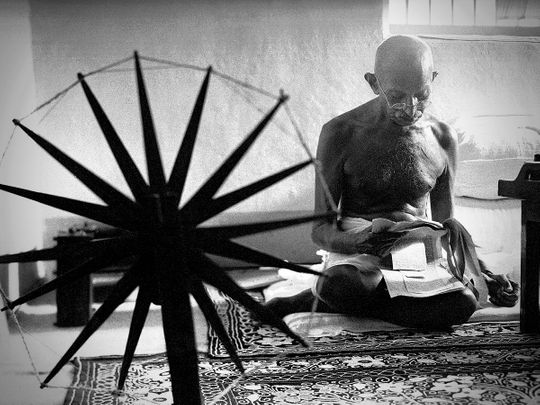
Seventy-five years ago, on January 30, 1948, a majoritarian fanatic killed Mohandas Karamchand Gandhi, popularly known as Mahatma Gandhi, by firing three shots at him from a point-blank range in a prayer meeting in Delhi.
Gandhi was not only the leader of India’s freedom movement, but he continues to be seen by many Indians as a national hero and fondly referred to as the Father of the Nation.
However, in recent years, some right wing elements in India have started an unrelenting campaign to sideline Gandhi and project his assassin, Nathuram Godse as a hero instead.
Gandhi is known as an ardent advocate for Hindu-Muslim unity, and that goes against this lot’s fascination for hate and divisive politics. A movie has been made to paint his heinous, hateful cold-blooded killing of Gandhi as an ideological struggle.

Jawaharlal Nehru had aptly described Gandhi to British filmmaker Richard Attenborough, “a great man, but he had his weaknesses, his moods, and his failings.”
Most inspiring personality
Despite being vilified by his critics at home and abroad, Mahatma Gandhi continues to be one of the most inspiring personalities in the world and certainly the most influential leader India has produced for centuries. Even after 75 years of his death, Gandhi remains one of the most instantly recognisable figures worldwide.
In 2009, when a high school student asked US President Barack Obama about his choice of a person, dead or alive, he would like to dine with, the answer was Mahatma Gandhi.
Obama, describing Gandhi as his ‘real hero,’ explained how Gandhian ideas and ideals had inspired people around the world, including Dr. Martin Luther King, to wage a non-violent movement for civil rights in the US.
Gandhi is well known for his non-violent resistance that helped to end British rule in India and has inspired several civil disobedience movements across the globe. In 1959, when American civil rights leader Dr. King visited India with his wife, both decided to spend a night in the house in Mumbai, where Gandhi used to live in the 1920s.
Influence on American civil rights movement
Gandhi’s influence on the civil rights movement in the US even predates Dr. King, as other African-American leaders like Howard Thurman and Benjamin Mays had travelled to India to meet Gandhi and be introduced to his political vision and strategy.
While Mahatma Gandhi’s influence on the American civil rights movement is well-known and often cited, not many are aware of the impact Gandhi had on Cesar Chavez to organise his non-violent action in the 1960s-70s to successfully demand better wages and working conditions for millions of farm workers in the US.
His movement strategy was styled after Gandhian methods — abstaining from violent acts, a 25-day hunger strike, and refusing to pick grapes from farms.
Chavez credits his political awakening to seeing a newsreel as a kid in which a “half-naked man without a gun (Gandhi) had conquered the might of the British Empire.”
Mahatma Gandhi had not only influenced Dr. Martin Luther King and Cesar Chavez; his moral ideals and political strategies have also inspired Dalai Lama and Nelson Mandela. The struggle against apartheid by the African National Congress, though was not always committed to a non-violent approach, Mandela never ceased to see Gandhi as his inspiration.

The African National Congress often adopted the Gandhian strategy of passive protest against oppression to oppose the apartheid regime. After the end of the apartheid era, President Mandela also adhered to Gandhian values of forgiveness and compassion, which helped his country maintain peace and social cohesiveness, and transit to a smooth political transformation.
Non-violent movement
Ibrahim Rugova’s non-violent movement that led Kosovo to the path of independence also drew inspiration from Mahatma Gandhi. Rugova, widely known as ‘Balkan’s Gandhi,’ is widely admired for pursuing a non-violent strategy to resist Serbian rule during his lifetime.
Undoubtedly, Gandhi’s non-violent political action strategy continues to have mass appeal. It has influenced many mass movements in the last 75 years, facilitating a peaceful transition of power and initiating social change.
Mahatma Gandhi’s passionate adherence to the five pillars of practicing non-violence — respect, understanding, acceptance, appreciation, and compassion — is more relevant now for our existence than ever before. The world is currently witnessing an increasing number of wars, mass killings, and the rise of far-right forces.
Gandhian ideals of non-violence and compassion are needed more than ever to guide the actions and policies of individuals, societies, and nation-states.
More than anyone, it is India that needs Gandhi the most, and the time for Indians to remember Martin Luther King’s wise words: “If humanity is to progress, Gandhi is inescapable. He lived, thought, and acted, inspired by the version of humanity evolving toward a world of peace and harmony. We may ignore him at our own risk.”











